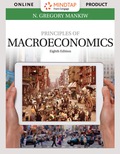
ECNS 202 PRINTOUT
8th Edition
ISBN: 9781337096584
Author: Mankiw
Publisher: CENGAGE L
expand_more
expand_more
format_list_bulleted
Question
Chapter 16, Problem 6QR
To determine
Why banks don’t hold 100 percent reserves and how the reserves are related to the money that the bank creates.
Expert Solution & Answer
Want to see the full answer?
Check out a sample textbook solution
Students have asked these similar questions
The following diagram illustrates the demand and
marginal revenue curves facing a monopoly in an industry
with no economies or diseconomies of scale. In the short
and long run, MC = ATC.
a. Calculate the values of profit, consumer surplus, and
deadweight loss, and illustrate these on the graph.
b. Repeat the calculations in part a, but now assume
the monopoly is able to practice perfect price
discrimination.
The projects under the 'Build, Build, Build' program: how these projects improve connectivity and ease of doing business in the Philippines?
how utillity relate to microeconomics ?
Chapter 16 Solutions
ECNS 202 PRINTOUT
Ch. 16.1 - Prob. 1QQCh. 16.2 - Prob. 2QQCh. 16.3 - Prob. 3QQCh. 16.4 - Prob. 4QQCh. 16 - Prob. 1CQQCh. 16 - Prob. 2CQQCh. 16 - Prob. 3CQQCh. 16 - Prob. 4CQQCh. 16 - Prob. 5CQQCh. 16 - Prob. 6CQQ
Ch. 16 - Prob. 1QRCh. 16 - Prob. 2QRCh. 16 - Prob. 3QRCh. 16 - Prob. 4QRCh. 16 - Prob. 5QRCh. 16 - Prob. 6QRCh. 16 - Prob. 7QRCh. 16 - Prob. 8QRCh. 16 - Prob. 9QRCh. 16 - Prob. 10QRCh. 16 - Prob. 1PACh. 16 - Prob. 2PACh. 16 - Prob. 3PACh. 16 - Prob. 4PACh. 16 - Prob. 5PACh. 16 - Prob. 6PACh. 16 - Prob. 7PACh. 16 - Prob. 8PACh. 16 - Prob. 9PACh. 16 - Prob. 10PACh. 16 - Prob. 11PACh. 16 - Prob. 12PA
Knowledge Booster
Similar questions
- How Command Economics Relate to Principle Of Economics?arrow_forwardhow commond economies relate to principle Of Economics ?arrow_forwardCritically analyse the five (5) characteristics of Ubuntu and provide examples of how they apply to the National Health Insurance (NHI) in South Africa.arrow_forward
- Critically analyse the five (5) characteristics of Ubuntu and provide examples of how they apply to the National Health Insurance (NHI) in South Africa.arrow_forwardOutline the nine (9) consumer rights as specified in the Consumer Rights Act in South Africa.arrow_forwardIn what ways could you show the attractiveness of Philippines in the form of videos/campaigns to foreign investors? Cite 10 examples.arrow_forward
- Explain the following terms and provide an example for each term: • Corruption • Fraud • Briberyarrow_forwardIn what ways could you show the attractiveness of a country in the form of videos/campaigns?arrow_forwardWith the VBS scenario in mind, debate with your own words the view that stakeholders are the primary reason why business ethics must be implemented.arrow_forward
arrow_back_ios
SEE MORE QUESTIONS
arrow_forward_ios
Recommended textbooks for you
 Economics Today and Tomorrow, Student EditionEconomicsISBN:9780078747663Author:McGraw-HillPublisher:Glencoe/McGraw-Hill School Pub Co
Economics Today and Tomorrow, Student EditionEconomicsISBN:9780078747663Author:McGraw-HillPublisher:Glencoe/McGraw-Hill School Pub Co Macroeconomics: Private and Public Choice (MindTa...EconomicsISBN:9781305506756Author:James D. Gwartney, Richard L. Stroup, Russell S. Sobel, David A. MacphersonPublisher:Cengage Learning
Macroeconomics: Private and Public Choice (MindTa...EconomicsISBN:9781305506756Author:James D. Gwartney, Richard L. Stroup, Russell S. Sobel, David A. MacphersonPublisher:Cengage Learning Economics: Private and Public Choice (MindTap Cou...EconomicsISBN:9781305506725Author:James D. Gwartney, Richard L. Stroup, Russell S. Sobel, David A. MacphersonPublisher:Cengage Learning
Economics: Private and Public Choice (MindTap Cou...EconomicsISBN:9781305506725Author:James D. Gwartney, Richard L. Stroup, Russell S. Sobel, David A. MacphersonPublisher:Cengage Learning Exploring EconomicsEconomicsISBN:9781544336329Author:Robert L. SextonPublisher:SAGE Publications, Inc
Exploring EconomicsEconomicsISBN:9781544336329Author:Robert L. SextonPublisher:SAGE Publications, Inc
 Economics (MindTap Course List)EconomicsISBN:9781337617383Author:Roger A. ArnoldPublisher:Cengage Learning
Economics (MindTap Course List)EconomicsISBN:9781337617383Author:Roger A. ArnoldPublisher:Cengage Learning

Economics Today and Tomorrow, Student Edition
Economics
ISBN:9780078747663
Author:McGraw-Hill
Publisher:Glencoe/McGraw-Hill School Pub Co

Macroeconomics: Private and Public Choice (MindTa...
Economics
ISBN:9781305506756
Author:James D. Gwartney, Richard L. Stroup, Russell S. Sobel, David A. Macpherson
Publisher:Cengage Learning

Economics: Private and Public Choice (MindTap Cou...
Economics
ISBN:9781305506725
Author:James D. Gwartney, Richard L. Stroup, Russell S. Sobel, David A. Macpherson
Publisher:Cengage Learning

Exploring Economics
Economics
ISBN:9781544336329
Author:Robert L. Sexton
Publisher:SAGE Publications, Inc


Economics (MindTap Course List)
Economics
ISBN:9781337617383
Author:Roger A. Arnold
Publisher:Cengage Learning